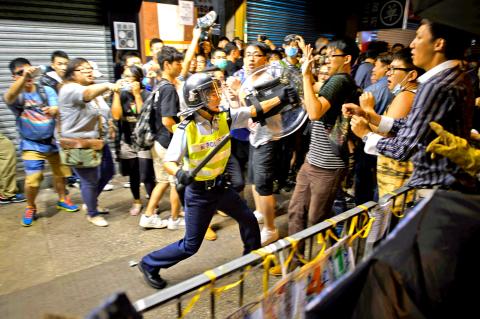Hong Kong pro-democracy protesters accused police of using excessive force against them after violent clashes yesterday, as a senior politician said weeks of rallies have reached a “critical moment.”
Dozens of police equipped with riot gear pushed into a crowd of angry demonstrators in the Mong Kok district early yesterday, striking at them repeatedly with batons.
Twenty people were injured in a fourth night of clashes between protesters demanding free elections for the semi-autonomous territory and police trying to restore traffic to the major Mong Kok thoroughfare that the demonstrators have brought to a standstill.

Photo: AFP
The spike in violence comes after three weeks of largely peaceful pro-democracy rallies and road blockades that paralyzed key parts of the Asian financial hub.
At a press conference at the Mong Kok camp yesterday, organizers blasted police for a response that left protesters with head wounds, fractures and bruises, with others carried away on stretchers.
Police said in a statement they used “minimum force” as protesters “suddenly attempted to charge” their cordon lines.
Talks between student protest leaders and government officials are still set to go ahead tomorrow, but with little common ground between the two sides, there are slim hopes of a breakthrough.
China insists that candidates for the 2017 vote for Hong Kong’s leader must be approved by a pro-Beijing committee — a condition protesters decry as “fake democracy.”
Hong Kong Chief Executive Leung Chun-ying (梁振英) has warned that Beijing authorities have no intention of backing down.
Hong Kong Secretary of Finance John Tsang (曾俊華) yesterday urged demonstrators to retreat.
“I was young before and I have taken part in various student movements,” he wrote on his blog. “Retreating is not an easy decision. It takes a lot of bravery. I still believe that you can take the courage to make right decisions at this critical moment.”
Protest leaders told the crowds in Mong Kok that a three-day “cooling off period” could help lower simmering tensions between police and demonstrators.
“Those who are sick and tired, please go home for 72 hours to have a cooling-off period,” said Ed Chin (錢志健) of Occupy Central, one of the main protest organizers.
Christian pastor Fung Chi-wood (馮智活) said that the police, for their part, should pledge a lighter-handed approach.
Some protesters at Mong Kok wore hard hats and makeshift protective gear fashioned out of household items. Posters stuck up around the camp read: “Calm down. Don’t forget our original purpose.”
The government information service said 20 people involved in protest activities had been injured between 10pm and 6am overnight from Saturday to yesterday, but would not specify how many were demonstrators or police officers, the extent of the injuries, or if they all took place in the Mong Kok area.
One volunteer medic said she had seen four people with head injuries with “serious bleeding,” as well as a back fracture.
“They hit us without any reason when we were standing behind the roadblock. I was hit by a police stick four or five times,” protester Jackie said as he sat at a local hospital with his head bandaged. “There was no aggressive action on our side.”

MISINFORMATION: The generated content tends to adopt China’s official stance, such as ‘Taiwan is currently governed by the Chinese central government,’ the NSB said Five China-developed artificial intelligence (AI) language models exhibit cybersecurity risks and content biases, an inspection conducted by the National Security Bureau (NSB) showed. The five AI tools are: DeepSeek, Doubao (豆包), Yiyan (文心一言), Tongyi (通義千問) and Yuanbao (騰訊元寶), the bureau said, advising people to remain vigilant to protect personal data privacy and corporate business secrets. The NSB said it, in accordance with the National Intelligence Services Act (國家情報工作法), has reviewed international cybersecurity reports and intelligence, and coordinated with the Ministry of Justice Investigation Bureau and the National Police Agency’s Criminal Investigation Bureau to conduct an inspection of China-made AI language

LIMITS: While China increases military pressure on Taiwan and expands its use of cognitive warfare, it is unwilling to target tech supply chains, the report said US and Taiwan military officials have warned that the Chinese People’s Liberation Army (PLA) could implement a blockade within “a matter of hours” and need only “minimal conversion time” prior to an attack on Taiwan, a report released on Tuesday by the US Senate’s China Economic and Security Review Commission said. “While there is no indication that China is planning an imminent attack, the United States and its allies and partners can no longer assume that a Taiwan contingency is a distant possibility for which they would have ample time to prepare,” it said. The commission made the comments in its annual

‘TROUBLEMAKER’: Most countries believe that it is China — rather than Taiwan — that is undermining regional peace and stability with its coercive tactics, the president said China should restrain itself and refrain from being a troublemaker that sabotages peace and stability in the Indo-Pacific region, President William Lai (賴清德) said yesterday. Lai made the remarks after China Coast Guard vessels sailed into disputed waters off the Senkaku Islands — known as the Diaoyutai Islands (釣魚台) in Taiwan — following a remark Japanese Prime Minister Sanae Takaichi made regarding Taiwan. Takaichi during a parliamentary session on Nov. 7 said that a “Taiwan contingency” involving a Chinese naval blockade could qualify as a “survival-threatening situation” for Japan, and trigger Tokyo’s deployment of its military for defense. Asked about the escalating tensions

DISPUTE: A Chinese official prompted a formal protest from Tokyo by saying that ‘the dirty head that sticks itself out must be cut off,’ after Takaichi’s Taiwan remarks Four armed China Coast Guard vessels yesterday morning sailed through disputed waters controlled by Japan, amid a diplomatic spat following Japanese Prime Minister Sanae Takaichi’s comments on Taiwan. The four ships sailed around the Senkaku Islands — known as the Diaoyutai Islands (釣魚台) to Taiwan, and which Taiwan and China also claim — on Saturday before entering Japanese waters yesterday and left, the Japan Coast Guard said. The China Coast Guard said in a statement that it carried out a “rights enforcement patrol” through the waters and that it was a lawful operation. As of the end of last month,